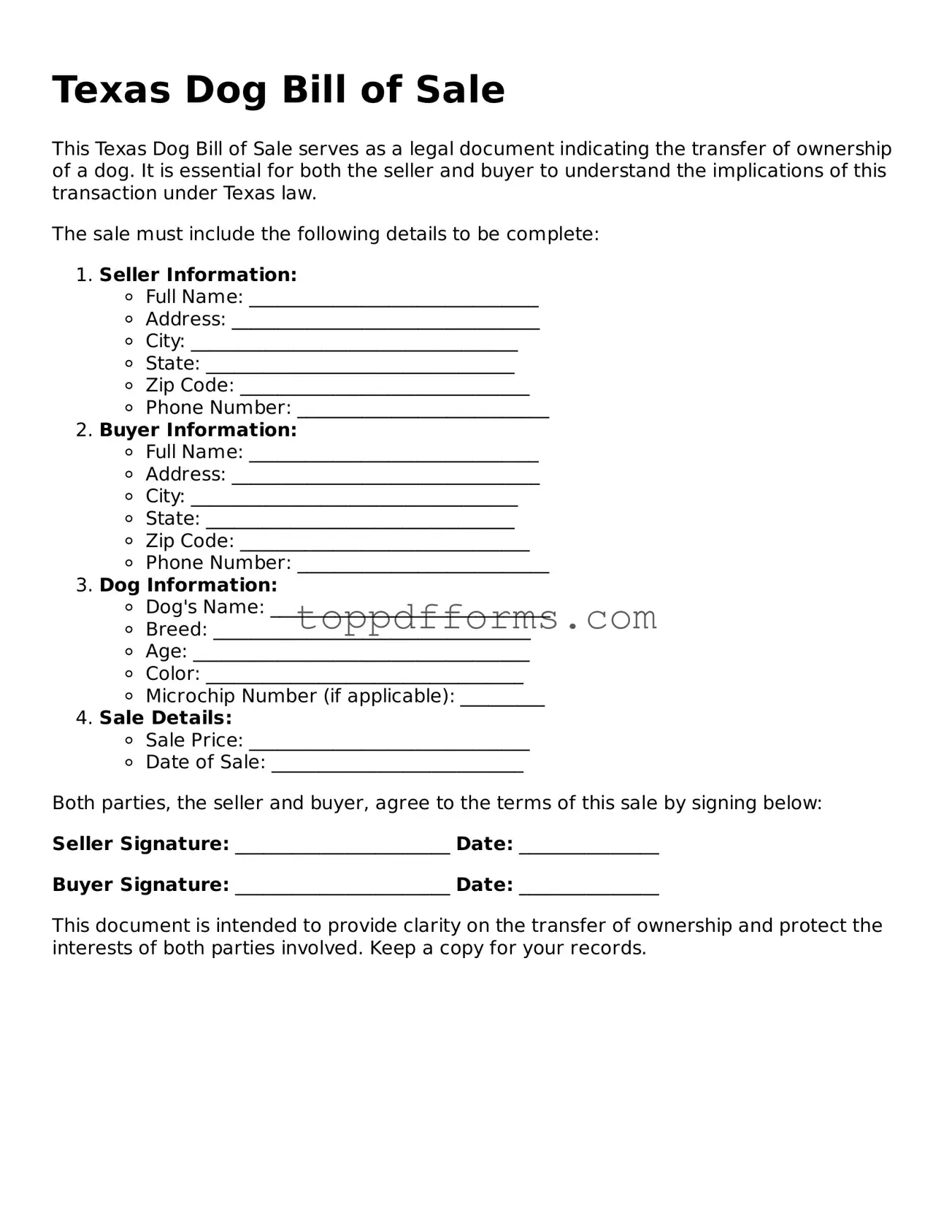Dog Bill of Sale Document for Texas State
Things You Should Know About This Form
What is a Texas Dog Bill of Sale form?
A Texas Dog Bill of Sale form is a legal document used to transfer ownership of a dog from one party to another in Texas. This form provides essential details about the dog, such as its breed, age, and any identifying features. It also includes information about the seller and buyer, ensuring both parties have a clear record of the transaction.
Why is a Dog Bill of Sale important?
This document serves multiple purposes. It protects both the buyer and seller by providing proof of ownership transfer. In case of disputes, the Bill of Sale can help establish who legally owns the dog. Additionally, it can be useful for registering the dog with local authorities or veterinary services.
What information is typically included in the form?
The form generally includes the dog's details, such as breed, color, age, and any distinguishing marks. It also requires the seller's and buyer's names, addresses, and contact information. The date of the sale and the purchase price may also be included, along with any terms or conditions related to the sale.
Do I need to have the Dog Bill of Sale notarized?
No, a notarization is not required for a Dog Bill of Sale in Texas. However, having it notarized can add an extra layer of protection and authenticity to the document. It can be beneficial if disputes arise in the future.
Can I use a generic Bill of Sale for a dog?
While you can use a generic Bill of Sale, it is advisable to use a specific Dog Bill of Sale form. A specialized form ensures that all necessary details related to the dog and the transaction are included, reducing the risk of misunderstandings or omissions.
Is there a fee associated with the Dog Bill of Sale?
There is no official fee for creating a Dog Bill of Sale, as it is a private transaction between the buyer and seller. However, if you choose to have the document notarized or if you seek legal assistance in drafting it, there may be associated costs. Always check for any local regulations that might apply.
PDF Overview
| Fact Name | Description |
|---|---|
| Purpose | The Texas Dog Bill of Sale form serves as a legal document for the transfer of ownership of a dog. |
| Governing Law | This form is governed by Texas Property Code, Title 2, Chapter 16. |
| Details Included | The form typically includes the dog's description, seller's and buyer's information, and the sale price. |
| Signatures Required | Both the seller and the buyer must sign the form to validate the transfer of ownership. |
| Record Keeping | It is advisable for both parties to keep a copy of the signed Bill of Sale for their records. |
| Notarization | While notarization is not required, it can provide additional legal protection for both parties. |
Common mistakes
When filling out the Texas Dog Bill of Sale form, many people overlook crucial details that can lead to complications down the road. One common mistake is failing to provide accurate information about the dog. This includes not only the dog's breed and age but also any identifying features such as color and markings. Without this information, it may be difficult to prove ownership later on.
Another frequent error is neglecting to include the seller's and buyer's contact information. Both parties need to have a clear way to reach each other after the sale. If a dispute arises or if the buyer has questions about the dog, having up-to-date contact information is essential. Missing this information can create unnecessary challenges.
People often forget to include the sale price. While it may seem straightforward, omitting this detail can lead to misunderstandings. It’s important to clearly state the amount agreed upon to avoid any confusion regarding payment and ownership transfer.
Additionally, not signing the form is a mistake that can invalidate the transaction. Both the seller and the buyer must sign the document to confirm that the sale has taken place. Without signatures, the Bill of Sale lacks legal standing, which can be problematic if any issues arise later.
Finally, many individuals fail to keep a copy of the completed form. After the transaction, it’s wise to retain a copy for personal records. This documentation can serve as proof of sale and ownership, which is particularly useful if any questions or disputes come up in the future.
Other Common State-specific Dog Bill of Sale Forms
Dog Contract - Can include additional terms, such as return policies or training support.
The completion of a Florida Divorce Settlement Agreement form is vital for couples navigating the complexities of divorce, as it clearly delineates the division of assets, debts, and other responsibilities. To access the necessary documentation, you can refer to https://floridaformspdf.com/printable-divorce-settlement-agreement-form, which provides a comprehensive template to ensure that all terms are understood by both parties and legally binding.
